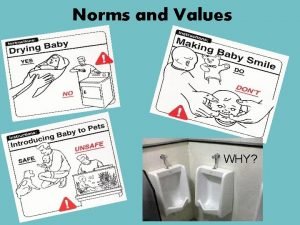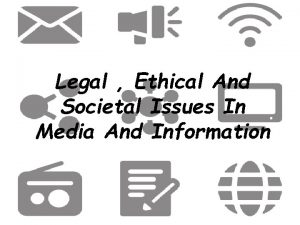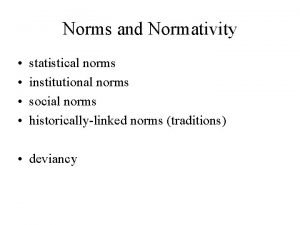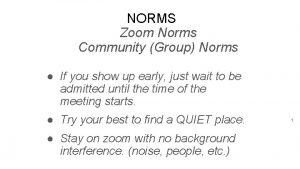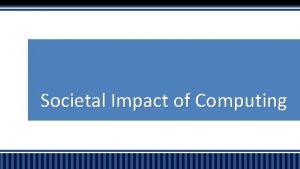Societal norms Individual An individual feels unwell and








- Slides: 8

Societal norms Individual An individual feels unwell and considers themselves to be ill. This awareness is mediated by their past experience and normal expectations of health and illness for the society in which they live, moderated by their education and access to information. Most ill health is never recorded and is treated accommodated by the individual and those around them.

Societal norms Patient Doctor Medical knowledge When the individual consults with a doctor they become a patient, identified by the health care system. The doctor makes a diagnosis and may initiate treatment, based on current medical knowledge and the support services available to them, moderated by their medical education and information access.

Societal norms Patient Doctor Health data Medical knowledge In most countries the doctor will keep some record of the diagnosis and consultation – this may be formally reported in the case of some infectious diseases, or may become part of aggregate statistical information from the health care system. It is apparent that much ill health is not recorded at all – this phenomenon is known as the ‘illness iceberg’.

Societal norms Patient Doctor Health data Medical knowledge Epidemiology The epidemiologist is concerned to study how diseases occur in different groups of people and why. Their work may generate additional health data. Their analysis is unlikely to directly affect this patient’s current illness, but may lead to understanding which affects general medical knowledge in relation to this condition and its treatment.

Societal norms Patient Doctor Health data Public health Medical knowledge Epidemiology The public health professional undertakes analysis concerned with interventions to promote and improve the health of everyone in society. Their analysis is unlikely to directly affect this patient’s current illness, but may lead to health education, vaccination or other initiatives that affect this society in future.

Societal norms Patient Doctor Health planning Health data Public health Medical knowledge Epidemiology The health planner undertakes analysis focused on the management of the health care system. Their analysis will take account of emerging patterns of ill health and trends in demand for health care, so that resources can be most directed to the most appropriate services in future. Their actions will have a more immediate impact on the doctor than their patient.

Societal norms Patient Social policy Doctor Health planning Health data Public health Medical knowledge Epidemiology The social policy maker is concerned with broad social policy, including the resources allocated to the health care system relative to areas such as education, welfare support, environmental management and defence. Many of these decisions will be driven by political considerations, informed from many perspectives, including the analysis of health.

Other agencies Societal norms Patient Social policy Doctor Health planning Health data Public health Medical knowledge Epidemiology Numerous other agencies are implicated in this sequence and have specific reasons to undertake or be interested in the results of health analyses. Examples include environmental managers given specific directives as a result of public health decisions; insurance companies evaluating health insurance risks, and pharmaceutical companies developing new treatments.
 Social norm example
Social norm example External social control
External social control Direct speech into indirect speech
Direct speech into indirect speech A visit to a doctor on monday текст перевод
A visit to a doctor on monday текст перевод Individual and societal bilingualism
Individual and societal bilingualism Individual multilingualism vs societal multilingualism
Individual multilingualism vs societal multilingualism Resourceful citer
Resourceful citer Legal, social, ethical and professional issues in computing
Legal, social, ethical and professional issues in computing Organic chemistry
Organic chemistry
